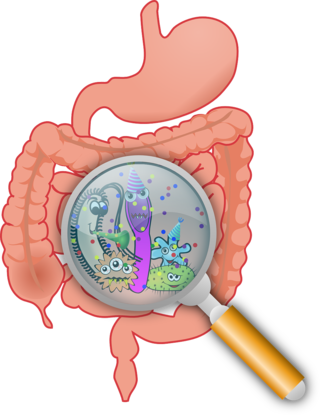Health
5 Surprising Ways Gut Health Affects Mental Health
Scientists continue to uncover secrets of the gut-brain axis.
Posted August 15, 2022 Reviewed by Devon Frye
Key points
- The gut-brain axis has been a hot topic of research in recent years.
- Altered gut microbiota have been linked to brain-based conditions such as depression, anxiety, autism spectrum disorder, and Alzheimer's.
- The hope is that changes in the microbiome may be harnessed to provide new non-invasive diagnostic biomarkers and treatments.

Inside the walls of your digestive system is a second brain: 100 million nerve cells lining your gastrointestinal (GI) tract collectively called the enteric nervous system.
"The gut-brain axis consists of bidirectional communication between the brain and the gut, which links emotional and cognitive centers of the brain with peripheral intestinal functions," says Professor Nick Spencer from the Flinders University College of Medicine and Public Health. "Recent advances in research have described the importance of gut microbiota in influencing these pathways."
Here are five surprising facts about gut health and how it can impact mental health.
1. The Gut Produces Most of the Serotonin in the Body
The intestine produces 95 percent of the body’s serotonin via specialized cells within the gut wall called enterochromaffin (EC) cells. Professor Spencer and colleagues published results earlier this year showing that EC cells release serotonin when they are stimulated by food, which then acts on nerves that communicate with the brain.
Although the serotonin hypothesis of depression has recently been challenged, the issue is complicated by the fact that serotonin drugs still work for many—and just how much of that may be due to their effects on the gut-brain axis is still being worked out.
2. Gut Bacteria and Metabolites Have Been Linked to Depression and Quality of Life
In recent years, mounting evidence has shown a link between altered gut microbiota and major depressive disorder (MDD). “The relationship between gut microbial metabolism and mental health is a controversial topic in microbiome research,” says Professor Jeroen Raes of the Flanders Institute for Biotechnology. “The notion that microbial metabolites can interact with our brain—and thus [our] behaviour and feelings—is intriguing.”
Multiple studies have reported that MDD is associated with decreased counts of bacteria that produce butyrate (such as Lachnospiraceae and Faecalibacterium) and short-chain fatty acids (such as Bifidobacterium and Lactobacillus). Some studies have reported a decrease in Bacteroidetes with MDD, which has also been associated with obesity and diabetes. Prof. Raes and colleagues also found that the presence of microbes that produce the neurotransmitter γ-aminobutyric acid (GABA) or a metabolite of the neurotransmitter dopamine was positively associated with mental quality of life.
Although most of these studies have been correlational, rats or mice that receive fecal microbe transplants from MDD patients exhibit depressive and anxiety-like behaviors, which suggests a causal effect of altered microbiota in depression.

3. Probiotics Enhance Antidepressants
Scientists from the University of Basel and the University Psychiatric Clinics Basel (UPK) reported in the journal Translational Psychiatry that probiotics can enhance antidepressant treatments.
Among subjects with depression, those given a probiotic in addition to antidepressants for 31 days showed an increase in lactic acid bacteria in their intestinal flora compared to those given antidepressants alone. They also showed a greater improvement in depressive symptoms and a normalization of brain activity in brain regions associated with emotional processing.
“Although the microbiome-gut-brain axis has been the subject of research for a number of years, the exact mechanisms are yet to be fully clarified,” said Anna-Chiara Schaub, a doctoral student in the Department of Psychiatry at UPK and a co-author of the study. “With additional knowledge of the specific effect of certain bacteria, it may be possible to optimize the selection of bacteria and to use the best mix in order to support treatment for depression.”
4. Those With Gut Disorders Are at Greater Risk for Alzheimer's Disease
Last month, a team led by Dr. Emmanuel Adewuyi at Edith Cowan University reported the discovery that Alzheimer’s Disease (AD) and gut disorders share a number of common genes. These common genes are involved in lipid-related and autoimmune cellular pathways.
"Looking at the genetic and biological characteristics common to AD and these gut disorders suggests a strong role for lipids metabolism, the immune system, and cholesterol-lowering medications," says Dr. Adewuyi. "Whilst further study is needed into the shared mechanisms between the conditions, there is evidence high cholesterol can transfer into the central nervous system… [and that] abnormal blood lipids may be caused or made worse by gut bacteria.”
The study's findings suggest that both diet and cholesterol-lowering medications such as statins could be effective treatments for both AD and gut disorders.
5. Gut Microbiota May Help Diagnose and Treat Anxiety, Autism Spectrum Disorder, and Parkinson's Disease
Along with MDD and AD, microbiota changes have been linked to several other brain-based conditions, such as anxiety disorders and Autism Spectrum Disorder (ASD).
For example, unique gut-microbiome signatures have been identified that distinguish MDD from general anxiety disorder. The relative amount of certain species of bacteria and the persistent underdevelopment of gut microbiota has been shown in children with ASD.
The hope is that such changes in the microbiome may be harnessed to provide non-invasive diagnostic biomarkers and treatments for these and other brain-based conditions linked to gut microbiota such as Parkinson's Disease, epilepsy, and headache disorders.
Conclusion
The relationship between gut health and mental wellbeing is an area of ongoing research. By studying this system, we may be able to develop new ways of diagnosing and treating mental health conditions. Although the progress that has been made so far is very promising, there is still a lot of work to be done in order to fully understand the role of the gut-brain axis in mental health.




